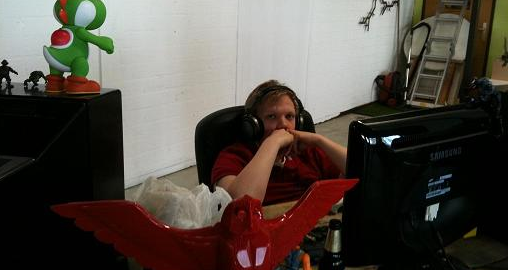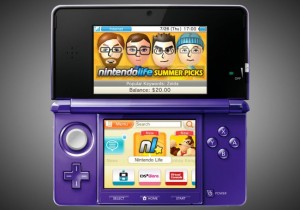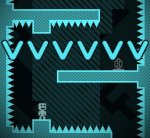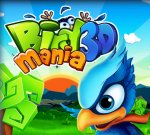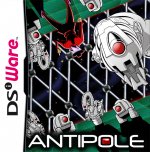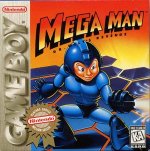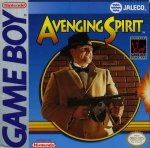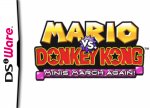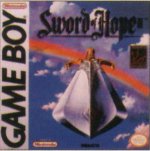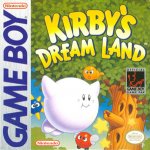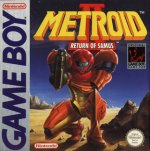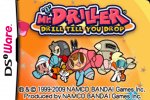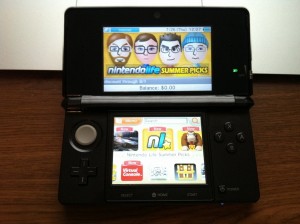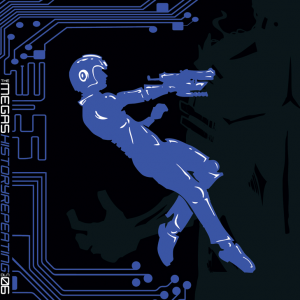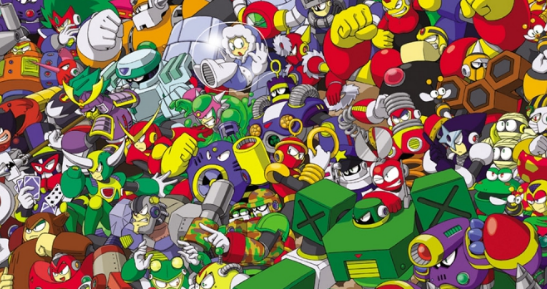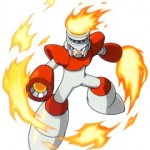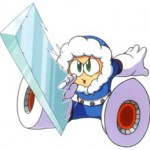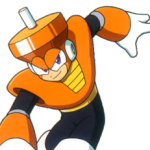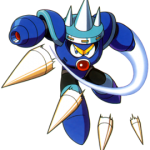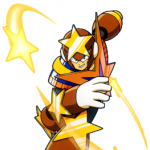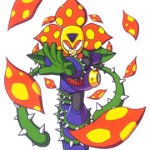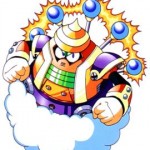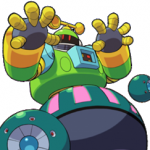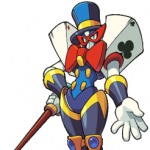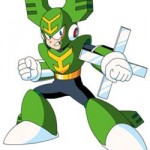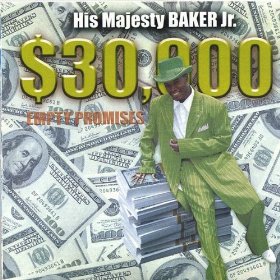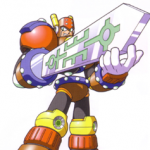Two years ago, Goodbye Galaxy Games appeared on the scene with Flipper, a destructive puzzler that reveled in its artful simplicity. Then late last year it got a sequel, Flipper 2: Flush the Goldfish. This time there was a completely different play style, artistic approach and overall more action-oriented experience. Both games were fairly well received, and without a doubt are all the more impressive because of the size of Goodbye Galaxy Games: one man. That man is Hugo Smits.
July saw the release of Hugo’s third game, Ace Mathician. It’s an educational game which — in an unusual move for the genre — wants to provide just as much game as education. With three games under his belt and no two of them alike, I wanted to take some time to speak with Hugo, and get his opinion on his design philosophy.
Along the way he also discusses his candidate for perfect game, why he feels video games are not art, the trials and tribulations of playing Commander Keen in Dutch, and why indie developers working today have it both better and worse than they’ve ever had it before.
1) Describe the moment that first attracted you to game design.
I think it was before Mortal Kombat 3 came out. I was a huge Mortal Kombat fan, all the neighbor kids would come to my house and we would play our own tournaments and stuff. So naturally we were all looking forward to Mortal Kombat 3!
In that time we didn’t have access to internet, so there wasn’t really any way to check out new things about the game. If we were lucky an older brother of my friends would buy a gaming magazine and it would have really fuzzy looking screenshots in there, probably taken from the arcade cabinets.
So there was a lot of room to fantasize, especially since the Mortal Kombat universe had so many secrets and hidden characters.
It got to the point where I would spend most of my time in class drawing awesome new Mortal Kombat characters, and coming up with cool moves for them. I think this is where the game design bug bit me.
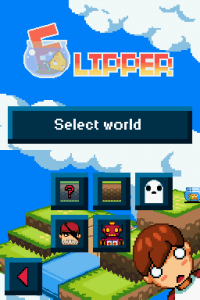 2) You’re a self described “guy in a little dark room with some Cheetos and cold, leftover pizza.” How do you feel that limits your output as a developer?
2) You’re a self described “guy in a little dark room with some Cheetos and cold, leftover pizza.” How do you feel that limits your output as a developer?
Well, I cannot make triple A games. And that’s about it. I think one of the best skills for a game designer is to know and pick his battles. It’s important to pick something you can do really well.
For example, I did not make any games with real 3D graphics in them. Instead I try to team up with the best pixel artists in the world and come up with a really awesome 2D style.
And it goes further than just assets. If you look at Flipper it uses amazing voxel technology that I think could be really fun in a FPS game. However, I don’t think the Xbox/PS3 crowd would be interested since the voxel world would be really blocky to look at.
Instead I went for the Nintendo DS. The target audience there was more interested in innovative concepts rather than graphics, so it fitted really well there.
On the whole business side of things, it means I don’t have the financial means to make a perfect game. And lately I don’t really know if that’s a good or bad thing. Personally I don’t like smooth games; I like them a bit raw around the edges. Just like a lot of old 8-bit games.
3) How would you say operating as a one-man team benefits you as a developer?
I always hate it when people say games are “art,” because I see them as entertainment and I think art is stupid. But I do believe a creator can leave a stamp on a game, something you cannot really see as player but which you will experience. Because I’m mostly working on this myself, I get to put a really big personal stamp on the games.
I think this is also why I get away with non-polished games. Because people feel the love and hard work shine through the cracks. A good example of a personal stamp is the bonus level in Flipper 2. It has the Hungarian March as background music. My girlfriend is originally from Hungary and we visit the country every two months or so. That’s a typical thing you won’t see anytime soon in a triple A title.
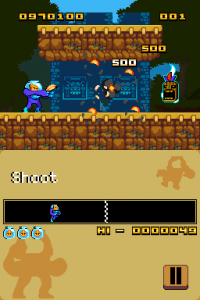 4) What would you say are the most important aspects of your game design philsophy?
4) What would you say are the most important aspects of your game design philsophy?
Make something innovative and unique. My games are not perfect, but they are enjoyable. If you can make a gamer have fun and let him experience something new, all the little faults don’t seem to matter.
5) You’ve spoken out before about a game’s length being used unfairly as a measure of its quality. Are there any other aspects of a game that you feel receive an undue amount of weight when determining that game’s worth?
The price is also one of those things. I always wonder what gamers use to determine the worth of a certain game. And maybe that goes hand in hand with the game’s length. If the game lets you do boring stuff for 15 hours, is that worth 30 bucks? is that really better than four hours of fun?
I know so many DS games that have something like this. After you complete a level, “OMG! Evil dude took over the world, everything is dark and stuff…go find the crystal.”
And then they let you play the exact same level you just played, but now they changed the lighting and everything is a bit more grim and the level is mirrored.
It’s just there because publishers want an 8-hour game that fits on a small cartridge. So the developer doesn’t have space/money/time to add extra content so they reuse old content. And ultimately they do this because the gamer wants 8 hours of gameplay for his 30 bucks.
More is not equal to better. Imagine if this would happen with movies. They have to be six hours long, so they stretch out the dialogue from a three hour movie. That would be really tedious.
And the same thing goes for games. Most players don’t reach the end of a game. I wonder how many quit because it was too hard, and how many quit because they are bored.
6) Where do you think this obsession with game length comes from? And do you feel it’s a destructive expectation on behalf of the consumer?
Well, I just think that consumers in general think more is better. In the end I think they steal from themselves, because this means developers have to spend time on those “extra” levels instead of purely focusing on the part that is really fun, and lose their chance to make it even more fun.
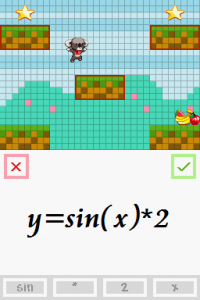 7) Given infinite financial resources and free reign over any licenses you could choose, what would be your dream project?
7) Given infinite financial resources and free reign over any licenses you could choose, what would be your dream project?
Crash Bandicoot…totally! The first three games where amazing. I like them even better than Mario 64 (please forgive me!). I don’t know, for some weird reason I can never plan my jumps correctly in 3D Mario games. It’s even worse in the Galaxy games when you’re upside-down.
Crash handles this perfectly with its linear straight path. Because of that they can have a steeper camera angle which makes jumping easier — after all, you don’t need to be able to see into the distance very far, since it’s so clear which way to go. They are also able to create better graphics because they know exactly where the camera will be looking at on object. (For example, in Mario 64 you can walk around a rock, seeing it from all sides. In Crash you can see only the front. So they can spend more polygons on the front and only a few on the back making the rock appear nicer).
Imagine the above and put it on a 3DS. It would fit so perfectly with the 3D screen since the levels run into the depth. It would be awesome!
9) Name one game that you would say has perfect (or as near to perfect as possible) design. Explain why.
Mortal Kombat 2.
I probably get flamed for this by Street Fighter fans. I mean, don’t get me wrong, Mortal Kombat isn’t perfectly balanced. But it was really a lot of fun. And one of the things that I think is genius is all of the hidden stuff.
It made the game so much bigger than it really is. Seeing new characters hiding behind trees in the background, not knowing how to unlock them or fight them until finally somebody in the neighborhood figures it out.
Every month or so we would discover something new and the game felt like it had endless possibilities. Especially if you included all the fake stories that surfaced.
I really like that in games. I have a big capacity for fantasy and I can really lose myself in a game universe.
10) Name one game that you feel could have been far better, if its own design hadn’t worked against it. Explain why.
Duke Nukem Forever. This one might seem easy, but I don’t mean it in that way. I love Duke Nukem, and I loved the old skool vibe of Forever. I even loved the graphics and sound. What made me not enjoy it was the fact that gameplay was stuck between oldskool and new.
I don’t know if they just picked the wrong parts from each generation or that the mix in general doesn’t work. But it made the game annoying.
For example, there are so many unique cool weapons, but you could only hold two. I would have preferred it more like Duke 3D, where you could just carry all the weapons at once.
If they would have just done a remake of Duke 3D instead I would still be playing it right now, and probably still be playing it for the next 10 years.
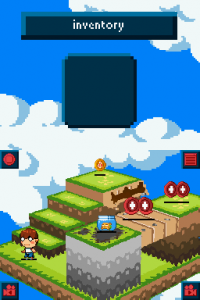 11) Apart from game design, what are some of your other hobbies?
11) Apart from game design, what are some of your other hobbies?
I like to play games. I have an old SNES in my office. But lately I’m really enjoying the PS Vita!
Not really a hobby but…my girlfriend tends to force me to take long walks with her in the forest.
12) The name of your company refers to the old Commander Keen PC games. Would you consider that to have been the golden age of PC gaming?
I played a lot of PC games all through the 90s. Commander Keen did influence me in a huge way, mainly because I didn’t own any consoles (thanks parents!) so couldn’t really experience Mario on the NES.
But I think the golden age was more the later part of the 90s. In the early 90s they were mainly playing catch up with the consoles (Keen released a few years later than Mario) and games never really looked as good as on the console (I’m looking at you Castlevania for MS-DOS!). While after the first 3D graphics cards hit the scene it was the other way around.
I also never bought games in that time. I didn’t even know you had to! My older cousin would show up with new floppies and that’s how I got games. It didn’t even occur to me that you could buy them!
So I wouldn’t call it a golden age from a technology or financial point of view. But boy do I remember all the hours playing Golden Axe, Ninja Turtles, Keen, Secret Agent (and all other Apogee games), Mortal Kombat 1, Street Fighter 2, Prince of Persia and all the other games! They are still definitely in my heart.
13) Do you feel indie developers have it easier now than they would have had it 20 years ago?
It’s just really different I think. Both answers can apply.
No; there is no way that an indie can make and compete with a triple A console game. Something that was easily possible 20 years ago.
Yes; 20 years ago there was no internet, and learning to program (in other languages than BASIC) was really difficult. It was harder to get in touch with people from the game development scene.
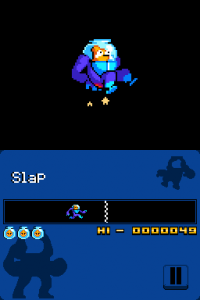 14) What do you like about working with Nintendo’s DSiWare service. Presumably it’s been a positive experience if you keep coming back.
14) What do you like about working with Nintendo’s DSiWare service. Presumably it’s been a positive experience if you keep coming back.
Well, I grew up with Nintendo handhelds and I love them. So making games for them is really cool. I would have liked it more to make retail/boxed games, but that’s only because I love game boxes! The DSiWare service is really nice in providing unique game ideas a platform and audience that cannot be reach trough retail (well you could, but a publisher has to take a big gamble on it which they don’t like to make).
15) What do you think Nintendo could improve about its download services?
Hmm…I think the eShop made a lot of things better. What I would like to see, but what we probably won’t see, is to be able to browse on my PC for games and buy them from my web browser.
Right now I can just click “buy now” for an iPhone game and it will open up a window for iTunes and that’s it.
The PC screen is bigger so it’s just easier to browse and check out info about a game.
But, again, I think the eShop is doing a really fantastic job. And I don’t really know how they can make it better on the machine itself.
16) What’s your favorite Bob Dylan song?
I’ll let you know when he makes some chiptunes.
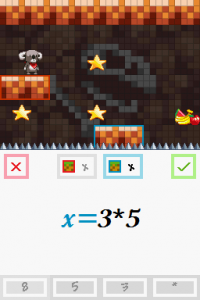 17) Provide some words of advice for young people who may be interested in pursuing a future in game design.
17) Provide some words of advice for young people who may be interested in pursuing a future in game design.
First off, don’t go to school and follow one of those lame “game development” courses. They are total bullshit, all of them. I always get in a lot of trouble saying this (multiple schools actually called me!) but it’s the truth.
Instead follow a normal computer or programming education, or drop out (like I did) and just spend every minute on game development. Because if you cannot (or you realize you don’t want to) get a job in the game industry, you can always work at a regular IT company.
Here’s the catch: to be successful you need to love it so much, that this is going to be the only thing you are going to do. Period. It’s not a job where you just do your work for 40 hours and that’s it. It will become your life.
Not many people realize this. Most people don’t want this.
I mean, most young kids think of the cool things they are going to do…like. “hey I’m going to make the next Call of Duty and all my friends are going to love it!.” But the truth is more about the things you’re not going to do.
You’re not going swimming with your friends. Instead you will sit in a dark room, coding. You will not go out with this cute girl on Saturday night. Instead you will be sitting in a dark room, coding.
I cannot remember the last time I actually had a weekend.
Not many people like to give up their entire live to make video games.
However, when you finish a game…it’s really the best feeling in the world. I’m always very happy and proud to see others play my games or talk about them.
The best tip anybody could give is this: just start! You can download all kinds of programs that will let you make games (there’s even a BASIC compiler for DSiWare called Petit Computer, so you can even make DS games). Just work on it in your free time.
In the best case you will get addicted to it, just like me! In the worst case you will stop after a few weeks but you at least learned something new about math/computers, and that’s always handy!
You can’t lose!
18) You’ve just traveled back in time 20 years. Provide some words of advice to your younger self.
ARGH! FOR GODSAKE! SAVE MEANS ‘OPSLAAN’ AND LOAD MEANS ‘LADEN’ IN DUTCH. YOU DO NOT HAVE TO PLAY THROUGH COMMANDER KEEN LIKE MARIO…YOU CAN SAVE!!
Just a few weeks ago, I wanted to play Keen 4 again. And I found out it had a save/load option… As a kid I didn’t know what it was or did. I thought you needed to play through the game in one sitting like Mario on the NES.
I can still feel the “plop” in my head and the blood rushing away from my fingers trying to fight every nerve in my body not to smash the computer into a million little pieces every time I saw the game over screen…
Aah…the memories!
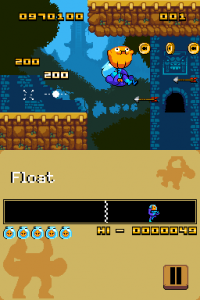 19) You’ve said that as much as you like to develop interesting and unique titles, you keep getting asked to create clones of already popular games. Is there much of a temptation to do so, in order to create some quick income?
19) You’ve said that as much as you like to develop interesting and unique titles, you keep getting asked to create clones of already popular games. Is there much of a temptation to do so, in order to create some quick income?
No, but I’m forced by Nintendo. One of the reasons I’m not making any new Nintendo handheld games anymore is because they aren’t open and transparent. They don’t show or share any numbers, so every time I do a project it is an all-or-nothing bet.
If I bet on the wrong horse, I have to worry how to pay the rent, and thus I will work on some DS retail games of Bejeweled clones.
Sales figures would help a lot. How many games can you sell on average? Does it matter in sales figures if a game is localized? Do 200 point games sell more than 500 point games?
I mean, take the top 20 for example. That doesn’t tell you anything! Let’s say you have a 500 point game on spot 3, and a 200 point game on spot 2. What does this tell you? That the 200 point game sold more! But how much more?
It could be twice as much as the 500 point game, or maybe three times as much.
This is critical to determine if something will be better for profit. Because two times 200 points is 400 points so that’s still below 500 points. You need to sell at least three times more copies to make more profit than a 500 point game! Argh!
20) Is there any particular aspect of your previous games that you feel has been unfairly criticized or misinterpreted by the majority (or a large number) of reviewers?
Not really. Maybe the length of Flipper 2. A lot of people thought the game was short because the story mode was short. Yet the story mode only served as a long tutorial. The real meat was in the random castle mode (300+ levels).
Most reviews I’m actually really happy with.
BONUS: Say anything to our readers that you would like to say that hasn’t been covered above.
Some people think because I don’t want to develop for the Nintendo 3DS, it means I don’t like the system. But that’s not true at all. I think it’s a great system. But unfortunately it’s too much work for a single person like me, to make a complete game that utilize all the features.
I have some cool ideas for 3DS games, and If I ever get the a good team and budget I would love to develop them!
Also, there are some complaints in the above interview, but overall I really enjoy and love my work! A big part of why it is so great is because of all the people that play and supported my games! Thanks so much for that! I also try to read everything you guys write about my games (even criticism).
So feel free to email me! Thanks!
Our appreciation to Hugo for taking the time out of his busy day of sitting in a dark room, coding. Be sure to check out his games; they’re a lot of fun.
